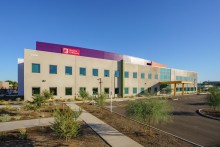771-780 of 3930 Results Found
Condition
Hirschsprung Disease in Children What is Hirschsprung disease in children? Hirschsprung disease is a rare birth defect. It affects the nerve cells in the large intestine. These nerve cells control the muscles that move food and waste, or stool, through the large intestine. The
Condition
Short Bowel Syndrome in Children What is short bowel syndrome in children? Short bowel syndrome is when the body has trouble absorbing nutrients from food because of a problem with the small intestine. It often happens to children who have had a large part of their small
Service
The Epilepsy Program at Barrow Neurological Institute at Phoenix Children’s is Arizona's leading pediatric epilepsy program, recognized nationally for excellence. We know that epilepsy is more than just a medical issue — it's a journey that impacts the entire family. With
For Patients, Families and other Caregivers
… Patients, Families and other Caregivers Center for Resiliency and Wellbeing (CRW) Hardship and heartbreak can happen in kids of … home or school environments, trauma or other challenges. Complications may include depression, anxiety, and a number …
Condition
Arrhythmias in Children What are arrhythmias in children? An arrhythmia is an abnormal heart rhythm. When a child has an arrhythmia, abnormal electrical signals sent through the heart muscle may cause the heart to beat too fast (tachycardia), too slow (bradycardia), or in an
Condition
Turner Syndrome (Monosomy X) in Children What is Turner syndrome (TS) in children? Turner syndrome (TS) is a genetic disorder that occurs in girls. It causes many traits and problems. Girls with TS are shorter than most girls. They don’t go through normal puberty as they grow
Condition
Juvenile Idiopathic Arthritis What is juvenile idiopathic arthritis? Juvenile idiopathic arthritis (JIA) is a form of arthritis in children. Arthritis causes joint swelling (inflammation) and joint stiffness. JIA is arthritis that affects 1 or more joints for at least 6 weeks in
Condition
Kidney Failure What is kidney failure? Kidney failure happens when damage results in loss of normal kidney function. There are 2 types of kidney failure—acute and chronic. Acute kidney failure starts abruptly. It can sometimes be reversed. Chronic kidney failure progresses slowly
Conditions We Treat
Children can be born with a motility disorder or develop one later. Some motility disorders are caused by a problem with the child’s anatomy or by another medical condition. Others are caused by poor habits learned during potty training. The Neurogastroenterology and Motility

